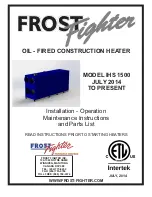
Installation
25
MAXXflo EVO
CONDENSATE DISPOSAL EXAMPLES
4.6 CONDENSATE DISPOSAL
Condensation is formed in the normal operation of the heater and this must be continuously discharged into
a drain. Given the acidity level of condense discharge (pH 3.5 - 4.5) only plastic material can be used for the
discharge pipe work. For a CWH 90 each 45kW heat engine can produce up to 4.5 litres of water per hour,
whilst at full load.
Whenever possible it is recommended that
all
condensate discharge pipework is connected to an internal
discharge point (such as a drain, sink, shower or toilet). When internal discharge is not possible
external
pipework should be fitted with a minimum of 40mm diameter. External pipework should be insulated to protect
against frost and freezing temperatures.
Use of 40mm plastic pipe with a drop of at least 30 mm for every metre of pipework is recommended.
CAuTION
The condensate trap must be filled with water before operating the heater.
It is important that the condensate flow must be maintained, even in freezing conditions. In
the event that the condensate becomes blocked, the heater will shutdown completely, and
will not operate again until the flow has been restored.
Soil / Vent Stack
There is no requirement for an additional trap or air
break when connecting drain pipework to an inter
-
nal or external soil or vent stack
Gully
There is no requirement for an additional trap
if discharging direct into an open gully.
MIN 110mm FR
OM A
BRANCH PIPE
110MM SOIL / DRAIN ST
A
CK
















































